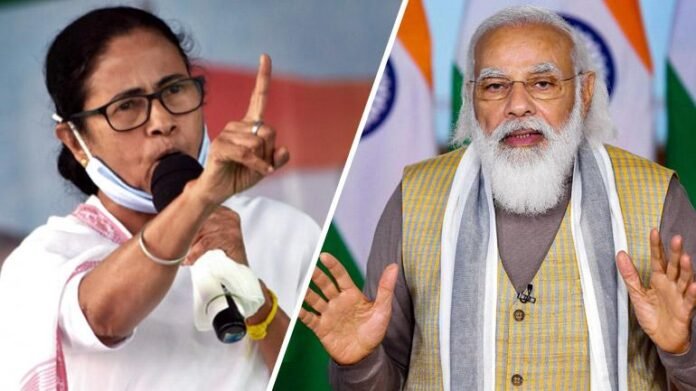The political landscape of India is often marked by sharp exchanges and fiery rhetoric, and the recent war of words between Prime Minister Narendra Modi and West Bengal Chief Minister Mamata Banerjee is a testament to this reality. The latest salvo in this ongoing battle came from Banerjee, who, in a public rally, declared that PM Modi had an “expiry date” in Indian politics. However, the Prime Minister swiftly responded, asserting his resilience and determination with a bold statement: “I am indestructible, I’m from…”
Mamata Banerjee’s remark, made during a rally in West Bengal, was seen as a direct challenge to PM Modi’s leadership and political longevity. Banerjee, a formidable political figure in her own right, has been a vocal critic of the Modi government’s policies and has emerged as a key opposition leader, particularly in the context of state-federal relations and issues of regional autonomy.
The Chief Minister’s assertion that PM Modi has an “expiry date” was interpreted by many as a bold assertion of her own political ambitions and a rallying cry for opposition forces seeking to challenge the dominance of the Bharatiya Janata Party (BJP) at the national level. However, PM Modi’s response, delivered with characteristic confidence and defiance, sought to counter Banerjee’s narrative and reaffirm his own position as a formidable leader on the Indian political stage.
PM Modi’s declaration of being “indestructible” and hailing from a particular place left the audience and political observers intrigued, sparking speculation about the intended message behind his statement. While the Prime Minister did not explicitly mention his place of origin, the phrase “I’m from…” hinted at his roots and upbringing, invoking a sense of connection to his heritage and identity.
The response from PM Modi was not just a rebuttal to Banerjee’s remarks but also a reaffirmation of his political persona as a leader with unwavering resolve and mass appeal. Throughout his tenure, PM Modi has cultivated an image of strength, decisiveness, and resilience, qualities that have endeared him to his supporters and earned him a formidable reputation on the national and international stage.
The exchange between PM Modi and Mamata Banerjee underscores the intense political rivalry between the BJP and the Trinamool Congress (TMC), particularly in the context of West Bengal, which has emerged as a battleground state in Indian politics. The TMC’s strong presence in West Bengal, coupled with Banerjee’s popularity as a regional leader, poses a significant challenge to the BJP’s efforts to expand its footprint in the eastern region of the country.
As the countdown to the next general elections begins, political tensions are expected to escalate, with both the BJP and the opposition gearing up for a fierce electoral battle. The war of words between PM Modi and Mamata Banerjee is likely to intensify as they seek to rally support for their respective parties and consolidate their political bases ahead of the polls.
Beyond the political theatrics, the exchange between PM Modi and Mamata Banerjee also highlights the broader dynamics of Indian democracy, characterized by a vibrant multiparty system, robust public discourse, and competing visions for the country’s future. In a democracy as diverse and dynamic as India, differing perspectives and ideological clashes are inevitable, shaping the contours of political discourse and shaping the nation’s destiny.
As PM Modi and Mamata Banerjee trade barbs and vie for political supremacy, the focus remains on the issues that matter most to the people of India, from economic development and social welfare to governance and security. Ultimately, it is the voters who will have the final say, determining the outcome of the electoral contest and shaping the trajectory of Indian politics in the years to come.

